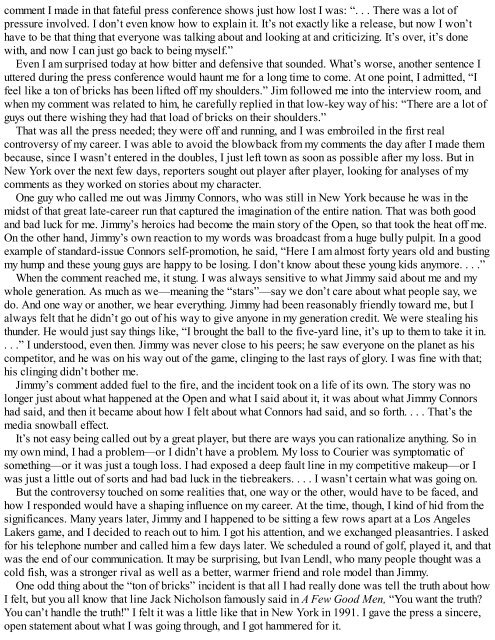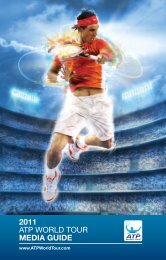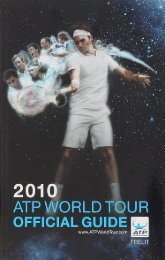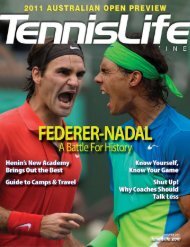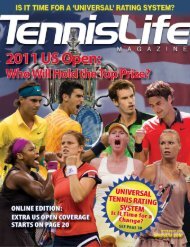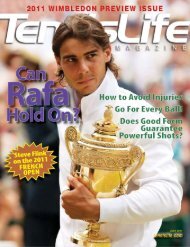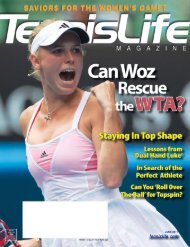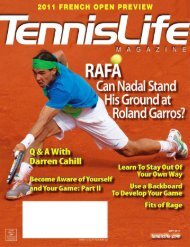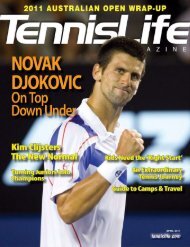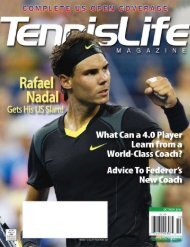A Champion's Mind - Pete Sampras
www.tennismoscow.me Insta:TENNISMOSCOW
www.tennismoscow.me Insta:TENNISMOSCOW
You also want an ePaper? Increase the reach of your titles
YUMPU automatically turns print PDFs into web optimized ePapers that Google loves.
comment I made in that fateful press conference shows just how lost I was: “. . . There was a lot of<br />
pressure involved. I don’t even know how to explain it. It’s not exactly like a release, but now I won’t<br />
have to be that thing that everyone was talking about and looking at and criticizing. It’s over, it’s done<br />
with, and now I can just go back to being myself.”<br />
Even I am surprised today at how bitter and defensive that sounded. What’s worse, another sentence I<br />
uttered during the press conference would haunt me for a long time to come. At one point, I admitted, “I<br />
feel like a ton of bricks has been lifted off my shoulders.” Jim followed me into the interview room, and<br />
when my comment was related to him, he carefully replied in that low-key way of his: “There are a lot of<br />
guys out there wishing they had that load of bricks on their shoulders.”<br />
That was all the press needed; they were off and running, and I was embroiled in the first real<br />
controversy of my career. I was able to avoid the blowback from my comments the day after I made them<br />
because, since I wasn’t entered in the doubles, I just left town as soon as possible after my loss. But in<br />
New York over the next few days, reporters sought out player after player, looking for analyses of my<br />
comments as they worked on stories about my character.<br />
One guy who called me out was Jimmy Connors, who was still in New York because he was in the<br />
midst of that great late-career run that captured the imagination of the entire nation. That was both good<br />
and bad luck for me. Jimmy’s heroics had become the main story of the Open, so that took the heat off me.<br />
On the other hand, Jimmy’s own reaction to my words was broadcast from a huge bully pulpit. In a good<br />
example of standard-issue Connors self-promotion, he said, “Here I am almost forty years old and busting<br />
my hump and these young guys are happy to be losing. I don’t know about these young kids anymore. . . .”<br />
When the comment reached me, it stung. I was always sensitive to what Jimmy said about me and my<br />
whole generation. As much as we—meaning the “stars”—say we don’t care about what people say, we<br />
do. And one way or another, we hear everything. Jimmy had been reasonably friendly toward me, but I<br />
always felt that he didn’t go out of his way to give anyone in my generation credit. We were stealing his<br />
thunder. He would just say things like, “I brought the ball to the five-yard line, it’s up to them to take it in.<br />
. . .” I understood, even then. Jimmy was never close to his peers; he saw everyone on the planet as his<br />
competitor, and he was on his way out of the game, clinging to the last rays of glory. I was fine with that;<br />
his clinging didn’t bother me.<br />
Jimmy’s comment added fuel to the fire, and the incident took on a life of its own. The story was no<br />
longer just about what happened at the Open and what I said about it, it was about what Jimmy Connors<br />
had said, and then it became about how I felt about what Connors had said, and so forth. . . . That’s the<br />
media snowball effect.<br />
It’s not easy being called out by a great player, but there are ways you can rationalize anything. So in<br />
my own mind, I had a problem—or I didn’t have a problem. My loss to Courier was symptomatic of<br />
something—or it was just a tough loss. I had exposed a deep fault line in my competitive makeup—or I<br />
was just a little out of sorts and had bad luck in the tiebreakers. . . . I wasn’t certain what was going on.<br />
But the controversy touched on some realities that, one way or the other, would have to be faced, and<br />
how I responded would have a shaping influence on my career. At the time, though, I kind of hid from the<br />
significances. Many years later, Jimmy and I happened to be sitting a few rows apart at a Los Angeles<br />
Lakers game, and I decided to reach out to him. I got his attention, and we exchanged pleasantries. I asked<br />
for his telephone number and called him a few days later. We scheduled a round of golf, played it, and that<br />
was the end of our communication. It may be surprising, but Ivan Lendl, who many people thought was a<br />
cold fish, was a stronger rival as well as a better, warmer friend and role model than Jimmy.<br />
One odd thing about the “ton of bricks” incident is that all I had really done was tell the truth about how<br />
I felt, but you all know that line Jack Nicholson famously said in A Few Good Men, “You want the truth?<br />
You can’t handle the truth!” I felt it was a little like that in New York in 1991. I gave the press a sincere,<br />
open statement about what I was going through, and I got hammered for it.


